Blog Post
At Common Cause: Honoring the Past, Present, and Future During Black History Month
Related Issues
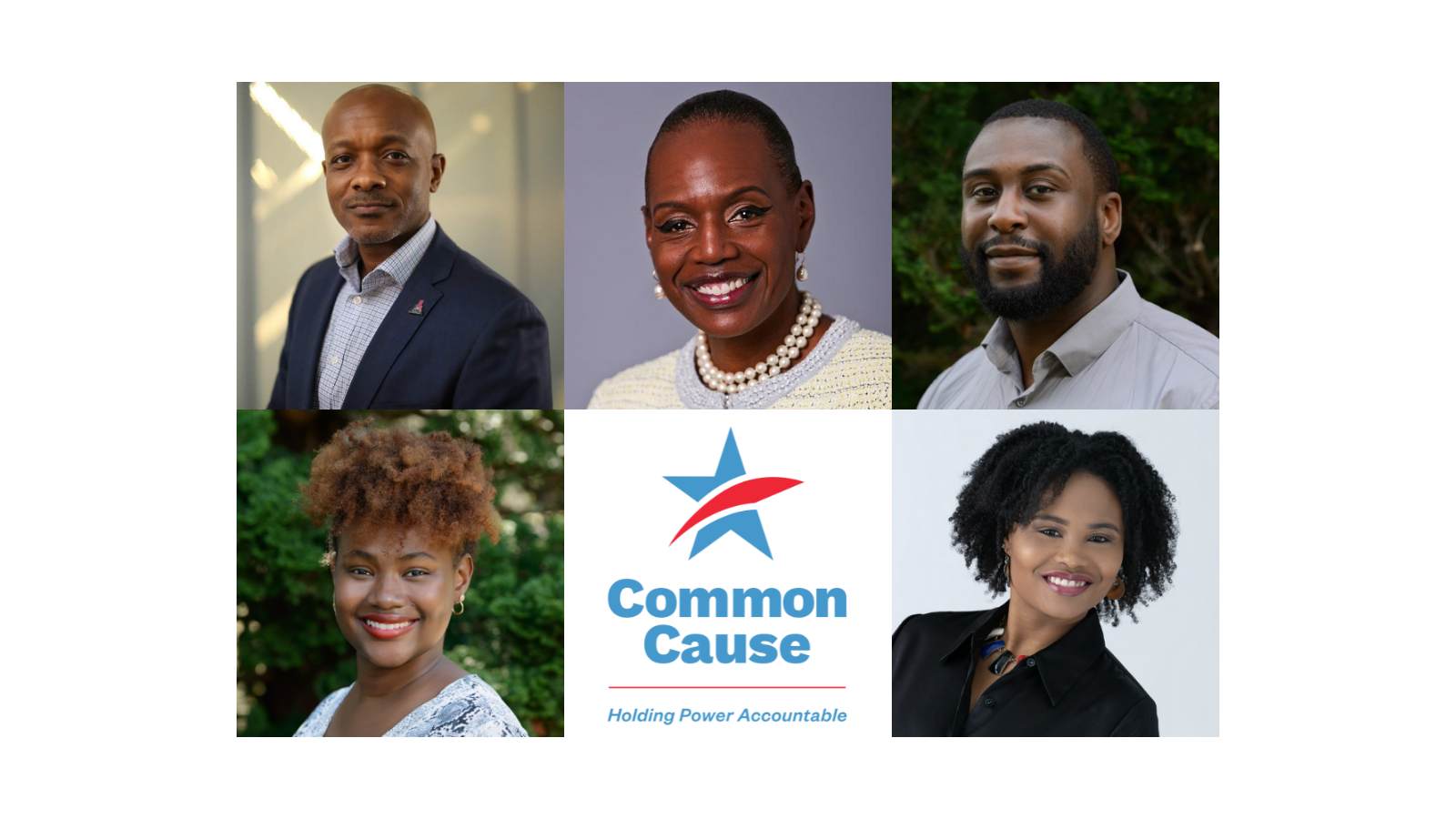
As we remember and honor the legacies of Representative John Lewis, Dr. Martin Luther King Jr., James Baldwin, Maya Angelou, and many other Black leaders – we also want to take a moment to appreciate the many Black history-makers who work right here at Common Cause.
From advocating for the freedom to vote to coordinating thousands of volunteers across the country, our Common Cause staff is constantly making Black History.
Please take a few minutes to learn about some of Common Cause’s present-day history-makers.
Khalif Ali, Executive Director of Common Cause Pennsylvania
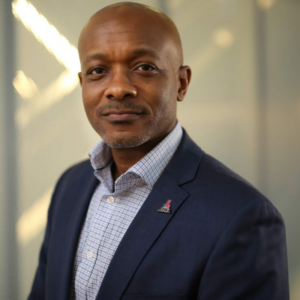
Tell us about yourself and your role at Common Cause.
I am the executive director of Common Cause PA. I am a native of Pittsburgh. The part of my background that is endearing is my community organizing experiences, and what I love most about my life is being a parent to my children and mentoring young, Black professionals.
Why is democracy work so important to you?
Democracy is important because when practiced with a cultural and racial equity lens, it offers marginalized populations an opportunity to be heard and recognized in this country.
Who is a Black activist or Black history-maker you admire?
Marc Lamont Hill is one of my most admired, modern Black activists. Historically, James Baldwin is someone that I’ve admired as a Black activist.
How have you made Black History?
By encouraging Black communities to not be intimidated by the current political climate. We can’t afford to withdraw from the practice of democracy. Practicing democracy is key to having our voices heard. Whether we are crafting a Black Agenda, organizing rallies, sending questionnaires to candidates, or voting, we can hold power accountable by remaining active. I remind Black people in my community and throughout the state that we matter and that if we refuse to be silenced then we will be heard.
Vashti Hinton Smith, College Outreach Coordinator with Common Cause North Carolina
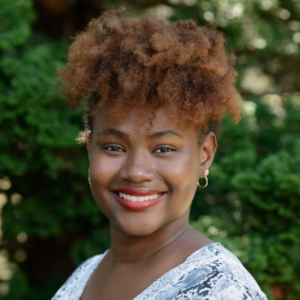
Tell us about yourself and your role at Common Cause.
I work with the North Carolina Historically Black College and University Student Action Alliance. I am a graduate of NC A&T State University. My work focuses on educating Black and brown students about social justice issues related to voting and advocacy.
Why is democracy work so important to you?
I fight to create spaces for all people to not only be heard, but to carve out truth and determine what kind of world they want—and not what we are told must be.
Who is a Black activist or Black history maker you admire?
Black writers. Toni Morrison, Audre Lorde, Maya Angelou, James Baldwin. Capturing Black stories that make people want to fight for a world they only dream of is priceless. Without writers, pieces of us—our stories, ideas—would get lost.
How have you made Black History?
I am not quite sure if I have ever made “Black history,” but I do know I am proud of the work I have been able to be a part of. I am even prouder of every student I have been able to work with to address issues in North Carolina. From gerrymandering to voting rights, to advocating for HBCUs—I am proud to be able to say that the students and people I’ve connected have all come together to make something beautiful, something worth fighting for.
Sam Ogundare, Assistant Director of Common Cause Rhode Island
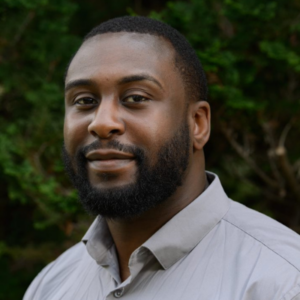
Tell us about yourself and your role at Common Cause.
As Assistant Director, I plan and execute all aspects of Common Cause Rhode Island’s development and programs, as well as manage the office.
In my tenure, I have raised $11,000 for 501(c)3 programs through “401Gives,” increased membership engagement by 10% through email outreach, and assisted in campaign planning for Vote Safe RI and Let RI Vote bills, to name a few accomplishments. Outside of work, I create music and perform at events when given the opportunity.
Why is democracy work so important to you?
Democracy work is important because the power to govern rests with Americans. Each American citizen should participate in ensuring all voices are represented in our government. While this statement should be true for everyone, entrenched structural racism continues to corrupt democracy for African Americans. It is my responsibility to help change this reality for my community.
Who is a Black activist or Black history maker you admire?
Dr. Martin Luther King is the most influential Black leader to me. His non-violent approach forced America to look in the mirror to confront their transgressions.
How have you made Black History?
As the son of two Nigerian immigrants, I made Black history by defying the odds. In my short career, I’ve had the privilege of being the first Black male to work in the executive office for the City of Central Falls and the Common Cause Rhode Island office.
Dani Arnwine, Voter Contact Fellow
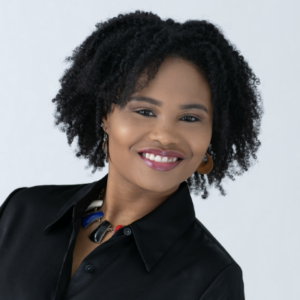
Tell us about yourself and your role at Common Cause.
My name is Dani Arnwine, and I am the Voter Contact Fellow at Common Cause. This past year, we made over 5 million calls resulting in more than 45,000 patch-throughs to Senators around the Freedom to Vote Act with the help of 10,500 volunteers. In my spare time, I also volunteer with the Jacksonville Section of the National Council of Negro Women, Inc. as the Social Action Committee Co-chair whose mission includes the empowerment and advocation for women and communities of African lineage.
Why is democracy work so important to you?
Democracy work, in my opinion, is important because it is the crux of the well-being of many Americans, especially those who look like me. Advocating for democracy reform is also closely tied to the history of my people and so is deeply personal to me.
Who is a Black activist or Black history maker you admire?
NCNW, Inc.’s National Chair and the first Black female president of Spelman College, Dr. Johnnetta B. Cole is a history maker whom I admire for her academic and civil rights leadership.
How have you made Black History?
During my Peace Corps service in Malawi as a Secondary School English teacher from 2018-2019, I was the youngest volunteer serving at that time.
Nicole Austin-Hillery, National Governing Board Member
Tell us about yourself and your role at Common Cause.
I am honored to serve on the Board of Directors for Common Cause. In this role, I serve on the Litigation Committee and the Policy Committee. I recently wrapped up a four-year tenure serving as the inaugural Executive Director of the US Program at Human Rights Watch. I will begin a new role as the President and CEO of the Congressional Black Caucus Foundation in late February. I have spent my entire legal career focused on civil and human rights. I became an attorney because I wanted to empower people who grew up like me and in communities like mine. I grew up in public housing and despised the labels placed and assumptions made about kids and people in my community, particularly assumptions that were made because we were Black and working class. I knew my community to be one where people were kind, supportive, and caring. My mother and my community placed no limits on what I could dream and what I could become. Becoming a civil and human rights attorney was the way I believed I could be a change agent and help empower people and communities, like mine, that were often discounted.
Why is democracy work so important to you?
The promises made to every person in the United States under the Constitution guarantee equal justice and opportunity under the law. The principle that underlies these promises is democracy. Because I believe in those promises and believe they are owed to every person in this country, I must also believe in democratic principles and work to protect them and ensure they work for everyone. Any threats to democracy are a threat to all who believe in what democracy stands for and the possibilities democracy provides. Any hopes for fairness and equity that I have and envision for all people, especially Black people, poor people, and other communities of color that have historically suffered due to economic inequality and discriminatory policies, lie in this experiment with democracy working successfully.
Who is a Black activist or Black history maker you admire?
I am a great believer in “unsung” heroes and heroines. One of the people whom I believe changed the course of American history and who was a quiet but powerful voice for change is Diane Nash. Diane Nash was a student leader in the Student Non-Violent Coordinating Committee (SNCC). She was one of the strategic architects behind so much of the work done by SNCC, particularly the student-led sit-ins and the Freedom Rides. Ms. Nash was courageous but never showed signs of fear or being intimidated. She allowed justice to serve as her moral compass regardless of the consequences or the high price that might be paid for freedom and justice. I have had the pleasure of presenting Ms. Nash with the Charles Hamilton Houston Award on behalf of the Washington Bar Association and spent precious and honored time speaking with her about her life’s journey and the work she did as a Black, female, student leader. She was amazing then and continues to be amazing in her teachings and her willingness to share and shape the next generation of leaders.
How have you made Black History?
I help to make Black History every day, and have since the day I was born, by being part of a collective of strong, loving, funny, courageous, and resilient people who have endured more trials and tribulations than I can recount in this short paragraph, and yet, have risen to greatness. My complicated yet full sets of experiences have helped to create, tell the story of, and lay the foundation for Black History that lives, thrives, and grows and will be passed down to generations that come after me. It is not possible to point out a sampling of examples because that would be too simplistic and fail to tell the rich story of how my everyday actions and experiences tell just a small part of Black History. This is not unique to me—it is the story of all Black people.
